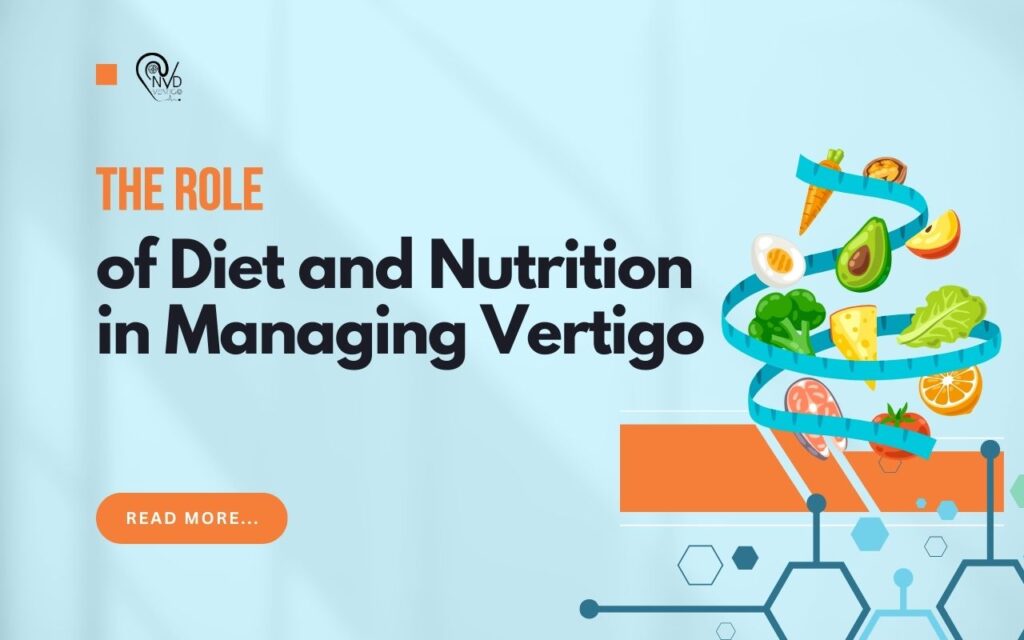Vertigo, a sensation of spinning dizziness, can significantly impact an individual’s quality of life. While medical treatments and therapies are often essential, diet and nutrition play a crucial role in managing and alleviating vertigo symptoms. As the best vertigo doctor in India, Dr. Nilotpal Dutta emphasizes the importance of a balanced diet and proper nutrition for patients dealing with vertigo.
Understanding Vertigo
Vertigo is often caused by issues in the inner ear or the vestibular nerve, which connects the inner ear to the brain. Conditions like Benign Paroxysmal Positional Vertigo (BPPV), Meniere’s disease, and vestibular neuritis are common culprits. Symptoms include dizziness, a spinning sensation, balance problems, nausea, and headaches.
The Impact of Diet on Vertigo
Diet and nutrition can influence vertigo in several ways. Certain foods and beverages can exacerbate symptoms, while others can help manage and reduce them. Understanding these dietary triggers and making appropriate changes can significantly improve the quality of life for vertigo patients.
Foods to Avoid
- Salt: High salt intake can increase fluid retention, which can worsen Meniere’s disease symptoms. Reducing salt in your diet helps control fluid balance in the inner ear.
- Caffeine: Caffeine can aggravate vertigo symptoms by increasing the fluid pressure in the inner ear. Limiting coffee, tea, chocolate, and energy drinks is advisable.
- Alcohol: Alcohol can interfere with the balance and coordination functions of the inner ear and brain, potentially worsening vertigo symptoms.
- Processed Foods: Foods high in sugar and preservatives can contribute to inflammation and fluid retention, exacerbating vertigo symptoms.
- Tyramine-rich Foods: Foods like aged cheese, smoked meats, and certain types of fish contain tyramine, which can trigger migraines and vertigo in some individuals.
Beneficial Foods and Nutrients
- Hydration: Staying well-hydrated is crucial. Drinking plenty of water helps maintain fluid balance and reduces the risk of dehydration, which can trigger vertigo symptoms.
- Ginger: Ginger has anti-inflammatory properties and can help alleviate nausea and dizziness. Incorporating ginger tea or fresh ginger in meals can be beneficial.
- Vitamin D: Deficiency in Vitamin D has been linked to an increased risk of BPPV. Foods rich in Vitamin D, such as fatty fish, fortified dairy products, and eggs, can help maintain adequate levels.
- Magnesium: Magnesium helps control nerve function and blood sugar levels. Including magnesium-rich foods like leafy greens, nuts, seeds, and whole grains can support overall health and potentially reduce vertigo symptoms.
- Vitamin B6: Vitamin B6 helps regulate the nervous system and reduce dizziness. Foods like bananas, avocados, spinach, and poultry are excellent sources.
- Omega-3 Fatty Acids: Found in fish like salmon and mackerel, as well as flaxseeds and walnuts, omega-3 fatty acids have anti-inflammatory properties that can benefit vertigo patients.
- Fresh Fruits and Vegetables: A diet rich in fresh fruits and vegetables provides essential vitamins, minerals, and antioxidants that support overall health and reduce inflammation.
Dietary Habits and Lifestyle Changes
- Regular Meals: Eating smaller, more frequent meals can help maintain blood sugar levels and prevent vertigo episodes triggered by low blood sugar.
- Balanced Diet: A well-balanced diet that includes a variety of nutrients supports overall health and reduces the likelihood of vertigo symptoms.
- Mindful Eating: Paying attention to how your body responds to certain foods can help identify and avoid triggers.
- Healthy Weight Management: Maintaining a healthy weight through diet and exercise can reduce the risk of conditions that contribute to vertigo, such as high blood pressure and diabetes.
Conclusion
While diet and nutrition alone cannot cure vertigo, they play a significant role in managing symptoms and improving overall well-being. As the best vertigo doctor in India, Dr. Nilotpal Dutta advises patients to adopt a balanced diet, stay hydrated, and avoid known dietary triggers. These dietary changes, combined with medical treatment and lifestyle modifications, can help individuals manage vertigo more effectively and lead a healthier, more comfortable life.
For personalized advice and treatment plans, consulting with Dr. Nilotpal Dutta can provide valuable insights and guidance tailored to your specific condition.




